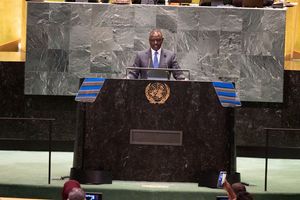Is single-use plastic ban the solution to Africa's pollution menace?

Plastic bottles at Gioto dumpsite in Nakuru City.
What you need to know:
- In Kenya, plastic makes up about 12 per cent of solid waste, totaling approximately 966,000 tonnes annually.
- Even Rwanda, often praised for its strict plastic regulations, faces ongoing challenges, with visible plastic waste in its waterways.
Africa is experiencing a serious plastic pollution crisis that threatens ecosystems and human health. Despite accounting for only five per cent of the world's plastic production, the continent is seeing a worrying increase in the use of single-use plastics due to urbanisation and population growth. In Kenya, for example, plastic makes up about 12 per cent of solid waste, totaling approximately 966,000 tonnes annually. Even Rwanda, often praised for its strict plastic regulations, faces ongoing challenges, with visible plastic waste in its waterways.
In response to the crisis, the East African Community (EAC) is moving forward with the EAC Prohibition of Manufacturing, Importation, Use and Sale of Single-Use Plastics Bill, 2023. This legislation aligns with the commitments outlined in the EAC and Global Plastics Treaty. It aims to promote environmental stewardship and sustainable development among member states to reduce the widespread use of single-use plastics, a major contributor to environmental degradation in the region.
The EAC Treaty emphasises collaborative efforts among partner states to preserve ecosystems and combat pollution. Its Article 112 mandates a unified policy for ecosystem preservation, while Article 113 focuses on preventing illegal dumping of hazardous materials and establishing a consistent legal framework for managing toxic substances. The Global Plastics Treaty reinforces these commitments by promoting a legally binding approach to tackle plastic pollution on a global scale. Together, these frameworks create a robust foundation for legislation mitigating plastic waste.
The draft bill introduces several key provisions aimed at regulating single-use plastics. It seeks to prohibit manufacturing, importing, selling, using, piling and disposing of specific non-essential single-use plastic items such as cutlery, plates, straws and food containers. This comprehensive ban is designed to reduce the volume of plastics entering the environment. It calls for all packaging to feature visible and legible markings to inform consumers about environmental impact, which is essential in raising awareness and encouraging responsible consumer behaviour.
A critical aspect of the draft legislation is its focus on establishing recycling and collection mechanisms. The law aims to promote responsible disposal practices among consumers and businesses through proper recycling, segregation and plastic waste collection. While it broadly prohibits single-use plastics, certain exemptions may apply where no viable alternatives exist such as medical applications or specific industrial uses.
The legislation emphasises robust waste management strategies like detailed collection measures for single-use plastics from various sources. Transitional provisions are included to manage existing stocks of single-use plastics during the transition period toward compliance with new regulations. This is to give businesses time to adapt while minimising disruption in supply chains.
The draft bill proposes several incentives to facilitate the effective implementation of these measures such as investing in waste management systems and infrastructure that support environmentally sound plastic waste management. These, it highlights, are crucial for developing efficient recycling facilities and collection centers capable of handling increased volumes of plastic waste as consumption patterns change.
Behavioural change incentives are another key component of this initiative. Programmes designed to encourage sustainable consumer behaviour throughout the value chain will be introduced, promoting practices such as reusing materials and reducing overall consumption of single-use plastics. This aims to empower consumers to make informed choices that benefit their communities and the environment.
The draft bill mandates partner states to report annual production and import figures related to single-use and highlight areas where additional intervention may be needed. Partner states will detail their measures to reduce consumption levels, including national targets for decreasing reliance on single-use plastics and promoting reusable alternatives.
The need for a legally binding global treaty has never been more pressing in light of these developments. Voluntary measures have proven insufficient, and a comprehensive treaty addressing all aspects of the plastic lifecycle, from production to disposal, is necessary. Upcoming negotiations in November 2024 during the Intergovernmental Negotiating Committee -5 in Busan, South Korea, will be pivotal in establishing global frameworks that currently guide plastic management efforts worldwide, now and in the long term.
The bill’s progress was highlighted during the second edition of The Africa Waste is Wealth Series. Hosted by the TakaTaka Ni Mali Foundation in collaboration with various stakeholders, this conference provided a platform for discussing sustainable waste management approaches in East Africa. Participants, including the East African Business Council, ALN Kenya (Anjarwalla & Khanna), and the Nairobi Rivers Commission addressed various strategies for promoting circular economy initiatives across the region.
TakaTaka Ni Mali has been crucial in advocating for effective waste management solutions while fostering community engagement in sustainability efforts. The organisation creates awareness around waste reduction while promoting alternative materials that contribute to a circular economy. It empowers communities to take ownership of their environmental impact by emphasising local involvement in waste management practices.
Collaborators at the conference agreed that aligning with regional treaties and global commitments will mitigate plastic pollution while fostering sustainable development across East Africa. As such initiatives gain momentum, they represent an essential step toward achieving a cleaner environment that benefits both people and nature alike.





